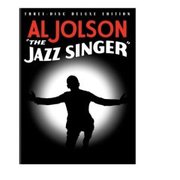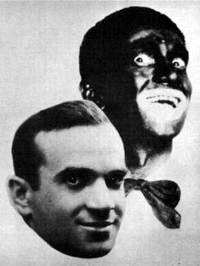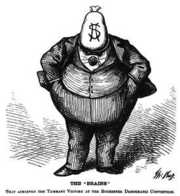And now for something completely different…
I’m no film reviewer, but I just felt a need to tell you about an amazing film I saw on TV the other day.
Stop laughing a moment. This is one of those films we all assume we know, because of what we’ve been told about it, and because it’s something that is supposed to be in our collective conscious. As the first mass market talking picture, it’s one of the most important films of all time, and when we think about it all that’s what we usually think about.
The Jazz Singer opened 80 years ago this month. It is regularly derided by critics as a minor piece, and in some ways it is. All the spoken parts are done as a silent, complete with speech cards, so there’s this shock when Jolson suddenly starts singing, an excitement you can still feel on behalf of your grandparents and great-grandparents.
But, seeing the whole thing, there is so much more. The actors are behaving as in a talkie, without the heavy pancake and darkened lips of so many silents. Even in the sections which are silent, it’s distinctively different. All the acting is naturalistic, not the measured pantomime we associate with the period.
Another important point, seldom made, is that this may be the American
film which showed the most respect for Jewish culture, specifically
Eastern European Jewish culture, in the 20th century. No film of the
30s, 40s, or even the 50s showed the temple, or a piece of the Yom
Kippur service, or treated the cantor of the temple as a hero. This
film does.
Slight spoiler. While the film is best known, if at all, for Jolson’s
performance of "Mammy" at the end, in full blackface, this is actually
a father-son story, a story about assimilation, a story of America and
what’s lost when we enter into it. Jolson is the cantor’s son, with the
cantor’s voice, and wants nothing so much as to become a famous
American singer. Which he does. But respect must be paid. You can have
America, but if you don’t keep the Old Country close you will lose your
soul. It’s a very modern story in that respect.
One more point about the blackface. It’s never explained, never
defended. It is so much of that era’s fabric the audience doesn’t feel
a need for that. We see Jolson put on the make-up, we see him appear to
his mother in it, we see that she doesn’t recognize him at first, and
we see him singing in it. Supposedly the idea was that a white actor in
blackface would feel "more free," better able to let loose and express
himself, hidden behind the mask. Supposedly the idea was that if you
were to sing black, you had to look and act it. Which you don’t.
I can certainly appreciate how many of my neighbors feel about this.
They feel insulted, and should. But this should not detract as much as
it seems to from the achievement of the film. If Jolson had put on
clown makeup and done Pagliacci it would have been the same thing. It
makes this a mature film, yes something of a period piece.
But talkies could have had a much worse start. Which was a lesson to me, and I hope will be a lesson to you.












